Efforts to Reduce GHG Emissions from Our Own Operations
Mitsubishi UFJ Financial Group (MUFG) recognizes that, among the environmental and social issues we face, the conservation and protection of the global environment is the shared responsibility of all of humanity, and is working to provide solutions for all stakeholders in order to realize the Purpose we established in April 2021, “Committed to empowering a brighter future.”
In the “MUFG Group Code of Conduct,” MUFG positions “Commitment to the Environment” as part of its employees’ “Responsibility as a Corporate Citizen,” and the Board of Directors sets forth the policy for the specific actions to be taken in order to implement commitment to the environment in the “MUFG Environmental Policy Statement.” The Policy Statement’s section on “Environmental Actions through Business Activities” stipulates “Reduction of Environmental Impact at Our Offices,” “Environmental Improvement and Pollution Prevention,” and “Awareness Raising Across the Group,” and efforts are being undertaken to address each of these areas.
Progress on Reducing GHG Emissions from Our Own Operations
To reduce GHG emissions and mitigate global warming, MUFG aims to achieve net-zero GHG emissions(note) in its own operations by 2030. In addition to efforts to conserve energy, MUFG is working to switch to renewable energy for the electricity it uses and to switch to electric vehicles (EVs) for its business vehicles. We have also set interim targets to steadily advance these efforts.
<Interim Targets>
・FY2025: Reduce domestic GHG emissions by two-thirds from FY2020
・FY2026: Reduce Group and global GHG emissions by 50% from FY2020
- Categorized as Scope 1 and Scope 2 in the GHG Protocol.
In FY2024, GHG emissions was 159 thousand tCO2e, which is a 16 thousand tCO2e (9%) decrease from the previous year (175 thousand tCO2e). This results in achieving our FY2026 interim target (50% reduction from FY2020) ahead of schedule. Moreover, MUFG obtained third-party limited assurance for the FY2022-2024 GHG emissions results.
Additionally, the total GHG emissions for Scope 3 (note) (Categories 1, 2, and 6) amounted to 1,427 thousand tCO2e.
- Indirect emissions other than Scope1 and Scope2
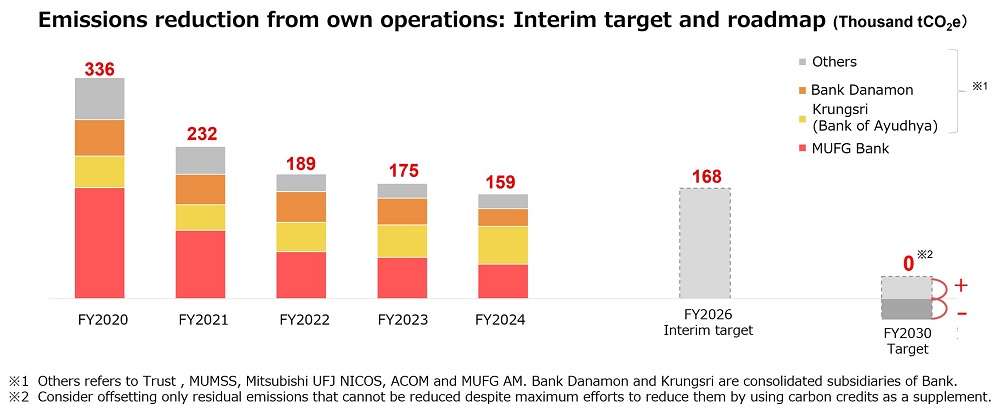
Efforts on Switching to Renewable Energy
Renewable Energy Use of Electricity
By March 2022, MUFG successfully shifted to 100% renewable energy for electricity procured by all domestic consolidated subsidiaries.
In July 2022, the Bank introduced renewable energy power generated by solar power generation at approximately 40 sites using off-site corporate PPA(note1). This makes it possible to purchase electricity derived from renewable energy over a long period of time. MUFG’ s efforts have directly contributed to an increase in the number of renewable energy sources with additionality(note2) in Japan, and will continue to actively promote activities to promote the spread of renewable energy.
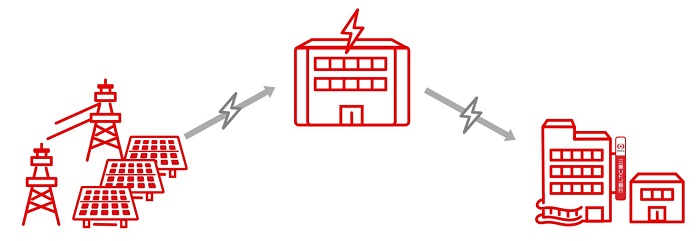
- PPA, or Power Purchase Agreement, is a service in which the power producers and electricity consumers execute a purchase agreement for renewable electricity for a price and period agreed in advance, and renewable energy generated from renewable power sources installed off-site, not in demand areas, is supplied to consumers via ordinary power grids.
- Contribution to the spread and expansion of new renewable energy through the introduction of renewable energy.
Efforts on Carbon Neutrality for Business Car
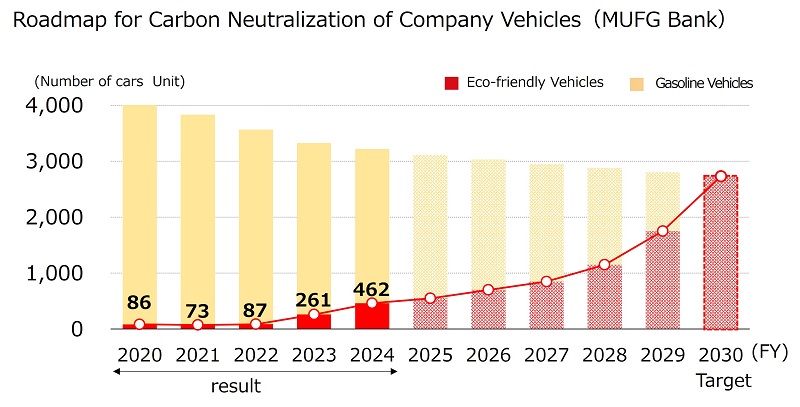
Efforts on Energy Efficiency and Conservation
Setting a Target on Energy Efficiency and Conservation
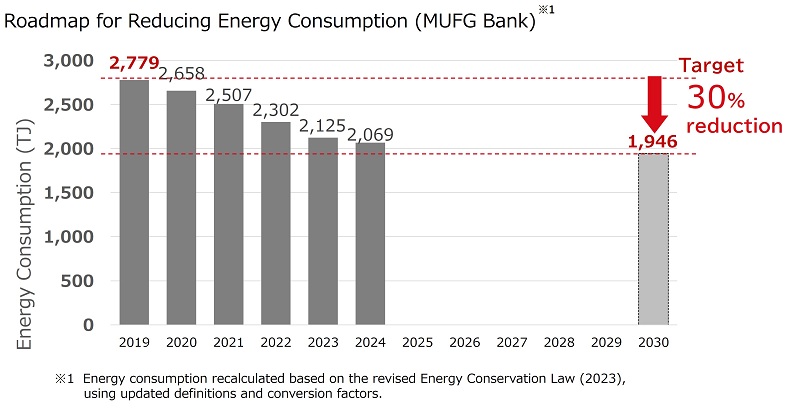
External Evaluation of Energy Conservation
Efforts to Conserve Energy in Buildings
- Certification as a net zero energy building, which is granted to buildings that achieve a 50% or greater reduction in primary energy consumption from the benchmark based on the building’s use, size, etc.
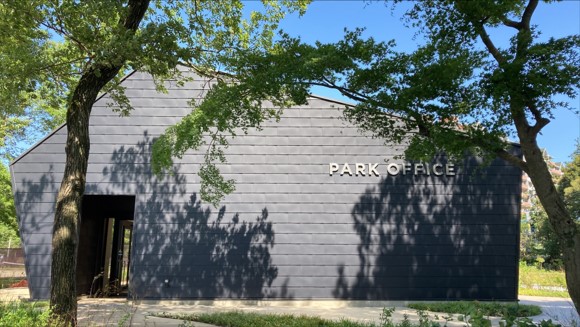
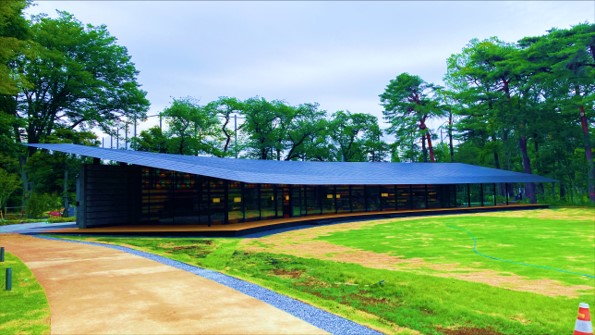
- The Comprehensive Assessment System for Built Environment Efficiency (CASBEE) is a method for evaluating and rating the environmental performance of buildings. It is a comprehensive assessment of the quality of a building, evaluating features such as interior comfort and scenic aesthetics, in consideration of environment practices that include materials and equipment that save energy or achieve smaller environmental loads.
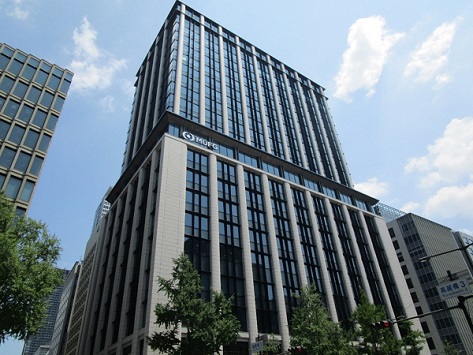
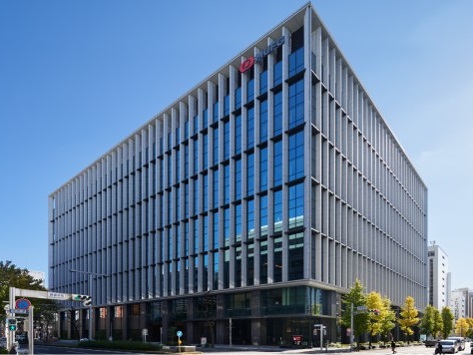
The MUFG/the Bank Tokyo head office building is slated for future reconstruction, and the plan is to build a new “MUFG Main Building” that is designed to be carbon-neutral, energy-saving, and resource-recycling, as well as to procure construction-related funds through green finance.
In other future reconstruction projects as well, MUFG will continue to pursue environmentally conscious building efforts such as obtaining ZEB and CASBEE certification.

Efforts Toward the Transition to a Circular Economy
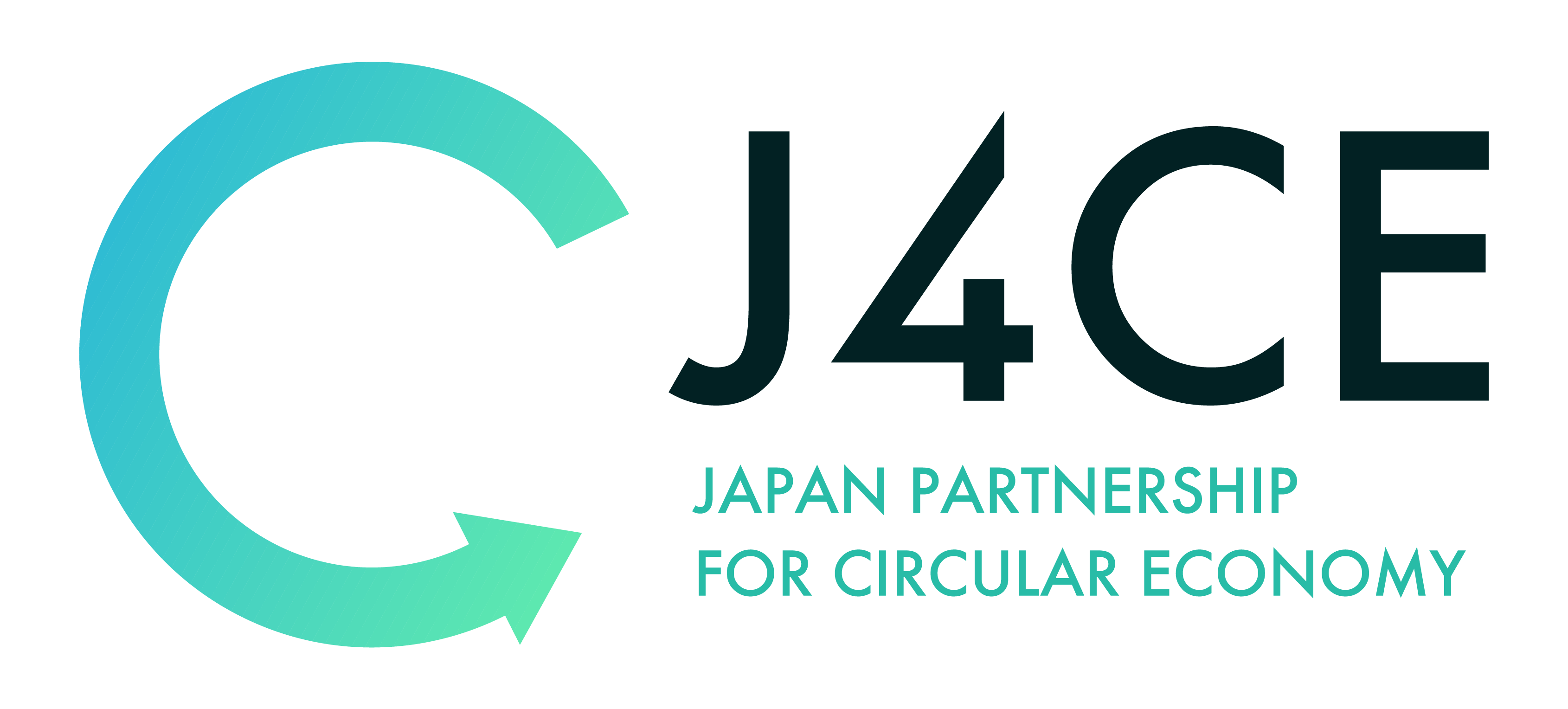
Recycling of Waste
Recycling of Waste
A target waste recycling rate of at least 90% has been set for MUFG locations in Japan, and making greater efforts to properly sort waste is being promoted by installing waste disposal stations where recyclable waste can be sorted, establishing rules for sorting and collection, and providing specific examples of proper sorting. In FY2024, the Bank achieved a 100% paper products recycling rate for its head office buildings in Tokyo, Nagoya, and Osaka. The Tokyo head office building is also conducting kitchen waste recycling, for which the FY2023 waste recycling rate was over 90% (97%). We aim to continue to improve the waste recycling rate, including at other head office buildings.
Overseas, Krungsri (Bank of Ayudhya) in Thailand has been promoting the “Krungsri Zero Waste” project since 2018. This project aims to raise employee awareness of waste problems through training sessions and waste sorting activities, and works to reduce and recycle waste.
Recycling of Waste Cooking Oil to SAF
- Energy that can significantly reduce carbon dioxide emissions compared to conventional aviation fuel

Recycling of floating oil and fat contained in cooking wastewater (conversion into biofuel)
Effective Use and Protection of Paper Resources
In order to effectively utilize forest resources, MUFG is reducing the amount of paper used along with reusing and recycling paper.
To reduce paper consumption, MUFG is tracking the number of printed copies, promoting smart work (Proactive use of online conference systems, projection of data on monitors, etc.), digitizing customer handouts, including bankbooks, prospectuses, and account statements.
The Bank purchased approximately 150 million sheets of A4 paper equivalent in FY2024, a decrease of approximately 59% from FY2019. From the viewpoint of conserving natural capital such as forests and biodiversity, we will continue to promote efforts to effectively use and reduce the use of paper resources.
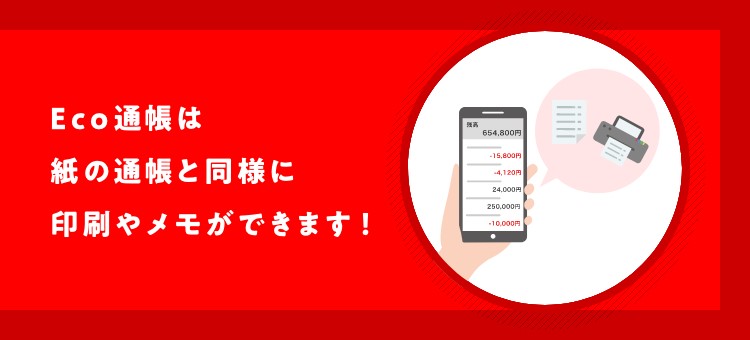
Reduce, Reuse, Recycle (3R) of Plastic and Switching to Renewables
In response to environmental problems concerning plastic such as the impact on the ocean and oceanic resources, MUFG is promoting initiatives to reduce, reuse, and recycle plastics (the “3Rs”) and adopt renewables(note).
Activities to reduce the amount of plastic used, such as encouraging employees to stop distributing straws derived from fossil resources at cafes and introducing cardless transaction services.
To reduce the amount of waste plastic bottles, MUFG's Tokyo head office is implementing an initiative to promote the use of personal bottles among 400 employees who volunteered from the Bank, Trust Bank, and Securities entities. Securities companies are also distributing their own bottles to employees and installing water dispensers in their offices.
As part of our recycling efforts, we have set up a recycling bin dedicated to plastic bottles to promote recycling through the sorting of plastic bottles. In FY2023, we achieved a plastic bottle recycling ratio of 100% at the Bank headquarters building (Tokyo, Nagoya, Osaka).
We are also promoting the shift to horizontal bottle-to-bottle recycling, with the Bank's headquarters building in Nagoya achieving a horizontal recycling rate of 100%. We will continue to promote horizontal recycling.
As for initiatives to switch to renewables, NICOS has adopted biomass-derived plastic for the clear wrapping it uses for its member information magazine, and MUFG will continue to pursue the switch to renewable resources for plastics.
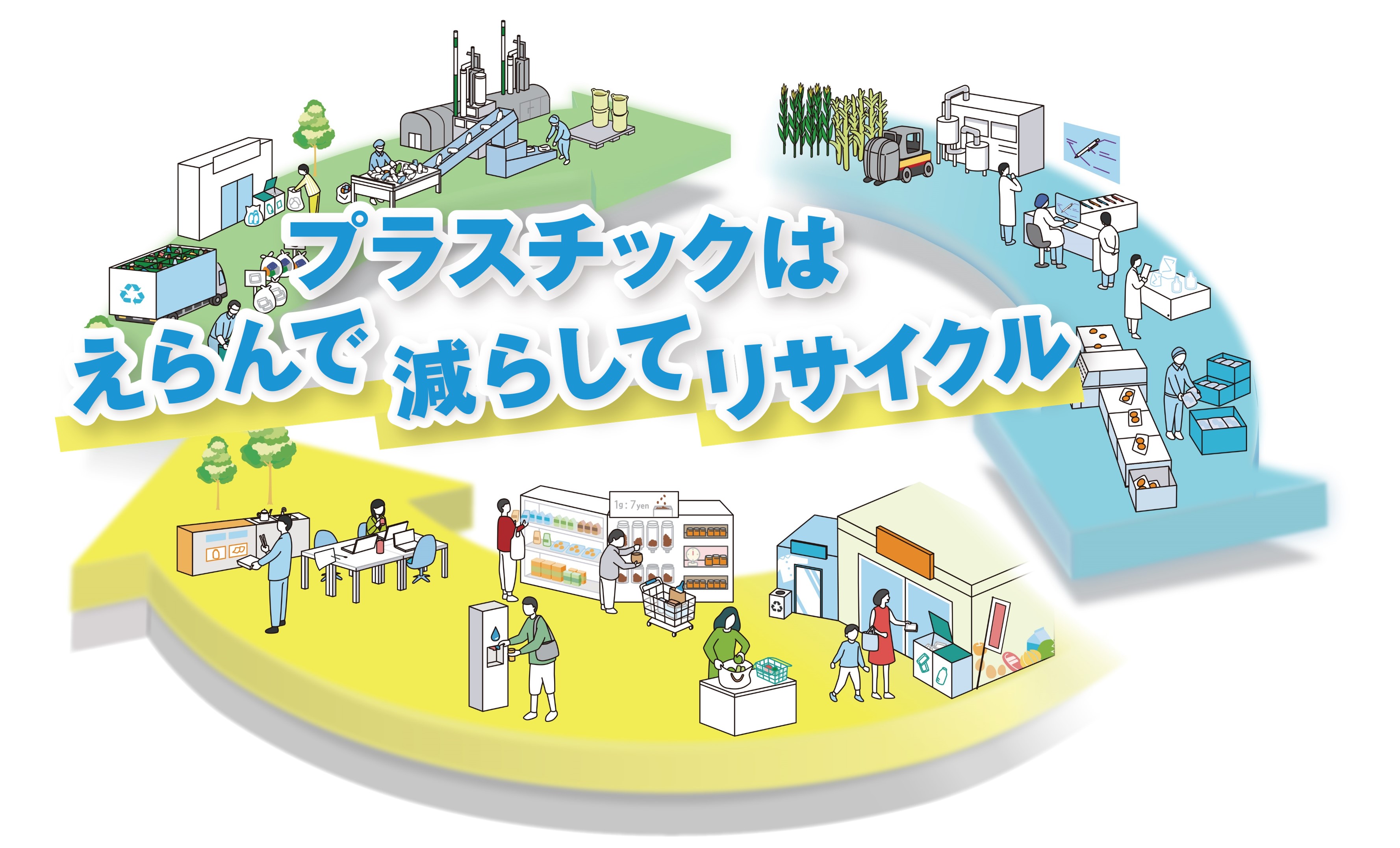
- ”Renewable” refers to substitution with a renewable resource such as paper or plastics derived from plant matter.

Efforts Related to Water Resources
MUFG is engaged in efforts on a global basis to conserve water through the effective use of water resources.
To promote the reuse of water and utilization of rainwater, water treatment and rainwater utilization equipment has been installed in some head office buildings in Japan.
Overseas, MUFG is working to reduce water usage at subsidiaries located in highly water-stressed countries. Krungsri(note) is taking measures such as wastewater reuse in order to reduce the amount of tap water used at the Bangkok head office, and has reduced water usage at its Phloenchit office by approximately 40% by installing water-saving equipment. In addition, Bank Danamon in Indonesia has installed hygienic water infrastructure in five regions.
We will continue to pursue various efforts to effectively utilize water resources.
- Krungsri established their “Policy for Environment, Resource, Occupational Health, and Safety” to promote and support the environmental management and resource efficiency. The policy presents a guideline to determine the environmental protection and resource conservation measures, including those related to water consumption as below.
- ・Communicate and campaign about correct and efficient water consumption
- ・Stipulate appropriate water consumption time (e.g., watering plants, cleaning space in front of the building, etc.)
- ・Use water-saving and environmentally friendly sanitary wares
- ・Stipulate measures on wastewater reuse (e.g., wastewater treatment per stipulated standards and wastewater reuse for some activities)
- ・Log monthly water consumption

